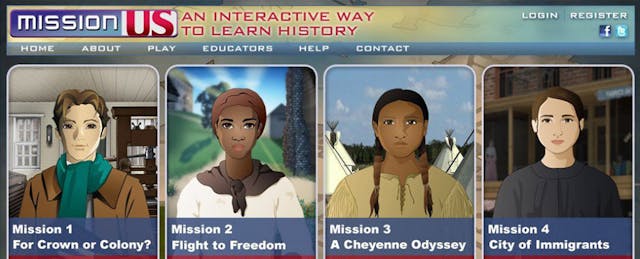Yesterday, I was shocked to open my email from Common Sense Media’s Graphite to find a recommendation and review for the game, Mission US: Flight to Freedom as a recommended piece of technology to “celebrate black history month and beyond” (it has since been removed). Flight to Freedom is a role playing game in which users step into the character of Lucy, a 14 year old slave, as she attempts to run away to the north to escape slavery.
Flight to Freedom is a simulation of slavery meant to give students an interactive look into history. It features everything the “edtech” buzzword community loves… role playing, badges, student choice and reevaluation of failure. The problem here is that it's about slavery, one of the darkest times in American history that STILL holds deep wounds--irresponsibly presented as a “too easy fix” on the part of the slaves themselves through decision making. Yes, Lucy, you’ll get a beating, and it’s not because you are a slave who is owned by an evil slave owner, but because you chose the wrong path. Thus, consequences.
The game is full of these moments. At one point, Lucy finds herself trying to find “the papers” proving that her “uncle” is free and in doing so encounters a random white man. She has a choice to tell him the truth that she’s trying to help her uncle or lie and stay quiet. It doesn’t take a genius to know that in those days, there was no good choice either way. Playing it safe, I chose to stay quiet. I was rewarded with…

Yes, he prefers “quiet negroes” and in case I needed it, there is sound… plenty of “authentic sound.”
Eventually Lucy is captured and carted off to be auctioned where we got to hear this description: "Niggress for $800."
Yes, "Niggress."
I honestly can’t even give this atrocity of a poor decision a thought beyond. Why?
- Why did the creators of this game find it necessary to create?
- Why put children through “decision making” as a slave?
- Why would any person think that slave simulation is a necessary component of curriculum?
- Why did no one question this prior to now?
- How does a game about slave simulation get funded even when a game similar to it resulted in a lawsuit by black parents?
- Why and how did the black researchers participate in this? Do you really believe that this was the way to honor our people and the best way for children to learn about slavery, the underground railroad and the countless numbers of people who died while trying to become free? Let’s reflect on the fact that this is a tiny snapshot of history but one that certainly deserved more thought than this.
If you want to create a role playing game about history, fine. Do it. But choose moments in history that are not about the rape, beating, degradation, mutilation and murder of a people. Do we really need to step into those shoes anymore than we have already?
Let me be clear in saying that learning about this time in history is necessary, but doing so in a role playing game is not appropriate.
If your idea of “celebrating” the contributions of Black people during the month of February is a lesson in slavery…you are the one that needs a lesson in history and the countless contributions that we not only have made but are still making.
Our enslavement is not and should not be your lesson on resilience and grit.
In the Words of Sabrina Stevens @TeacherSabrina (shared with her permission):
1. Simulation is almost impossible to do ethically, which is why so many people end up being fired for missteps in this area.
2. Enslavement happens between two peoples, it doesn’t just happen to one. Talking about black people being enslaved without adequately discussing the economic motivations of the slave holders and the centrality of slavery to America’s founding/ the origins of capitalism is erroneous and problematic.
It reinforces the idea that black people are somehow innately “slave-ish” versus illuminating the fact that white slave owners did this for a reason, and that the society benefiting from this brutality created elaborate legal, social and moral codes to justify it, including stereotypes that remain with us to this very day. You can’t understand oppression by rehashing/pitying the experience of the oppressed; only by also unpacking the motivations and actions of the oppressor. You can’t “celebrate” a people by constantly discussing up the worst thing that ever happened to them in an incomplete and misleading fashion, while absolving the people responsible for it of their guilt.


